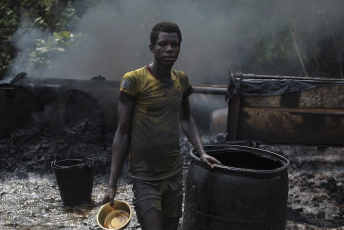Kenya exports its labour mainly to the Middle East, and to a lesser extent to Europe, North America and Africa. However many Kenyans are being held as slaves in Middle Eastern countries. Traffickers are able to operate mainly due to Kenyans’ socio-economic vulnerabilities, and the gaps in the legal protection of migrant workers.
While the country has many labour laws, some don’t directly apply to labour exportation, making them largely irrelevant regarding the protection of migrant workers. There is also a lack of coordination among Kenya’s many government ministries and departments involved in the enforcement of these laws.
While the country has many labour laws, some don’t directly apply to labour exportation, making them largely irrelevant regarding for the protection of migrant workers. Kenya's ministries of labour, foreign affairs and interior, and various other departments, councils and funding boards are all involved in regulating labour exportation. But a lack of coordination among these many agencies weakens law enforcement. These gaps hinder capacity to ensure the welfare and protection of trafficking victims from a well organised criminal market.
A robust regulatory and implementation framework with a single comprehensive foreign employment policy is needed to oversee labour exportation and also address the networks responsible for trafficking.
Kenya’s Counter-Trafficking in Persons Act says trafficking is when someone ‘transports, transfers, harbours or receives another person for the purpose of exploitation’. The act defines exploitation as including keeping a person in a state of slavery and forced labour with or without that person’s consent. Despite this act being in force for almost 10 years and having stiff penalties of between five years to life in prison, it has not curbed the crime.
The Kenyan Office of the Director of Public Prosecutions reports currently handling 30 cases of human trafficking. But none of the files involve forced labour to Middle Eastern countries. This shows that human trafficking to the Middle East is either not recognised, or not given priority by government.
Lucia Nekesa, recruited as a domestic worker to Qatar by a Kenyan employment agency, found herself in war-torn Iraq. Through a video shared on social media in August 2019, Nekesa tells of being abused and trafficked six times in 10 months.
She was rescued by the Kenyan government with the help of the International Organization for Migration and HAKI Africa – a Kenyan civil society organisation – in September 2019. Mathias Shipeta, rapid response officer for HAKI Africa, says it’s rare for victims of human trafficking to be rescued – pointing out that Nekesa’s case was an exception to the rule.
ENACT conducted a survey in May 2019 in Kenya’s east, coastal and Nairobi regions with returnee workers who had been trafficked and victims’ families who still had relatives in Middle Eastern countries.
The research found that almost all the 60 workers interviewed were exploited at their workplace. This included physical and verbal abuse, threats and intimidation, denial of medical attention, long working hours, restriction in their movement and communication, sexual harassment at work, being poorly fed and living and sleeping in unacceptable quarters.
Almost all had the terms of their employment contracts changed when they arrived at their destination country. This included salary cuts, change of job location, and longer working hours.
In September 2014 Kenya’s government banned employment agencies from recruiting Kenyans to work in foreign countries because of complaints raised by trafficked victims abroad, returnees, worker unions and civil society organisations. This led to the setting up of a multi-agency taskforce in October 2014 whose aim was to make recommendations to protect migrant workers and curb the activities of ‘briefcase employment agencies’.
The taskforce reported that around 200 000 Kenyans were working in Middle Eastern countries, of whom 130 000 were in Saudi Arabia and 22 000 in the United Arab Emirates. Other countries are Qatar, Oman, Bahrain, Jordan, Lebanon, Yemen and Iraq.
Seventeen recommendations were drawn up – which have either been only partly implemented, or not at all. The taskforce also didn’t make recommendations on the process of investigating and sentencing foreign and local employment agencies currently trafficking Kenyans.
There’s also nothing on addressing workers who were trafficked before the ban and who are still being trafficked in foreign countries. It appears to focus more on the mistreatment Kenyans face once they arrive in the foreign countries rather than the process they underwent beforehand.
Despite the government setting up a new registration process for employment agencies in 2017, trafficking continues to contribute to Kenya’s underground criminal economy. An ENACT survey with 20 employment agencies in Kenya revealed two categories of criminal actors driving this market.
First are foreign criminal networks of diverse nationalities involved in human trafficking under the guise of job recruitment. They are highly organised and have a horizontal working structure indicating that the various links in the value chain work separately, but all are in concert with local organised criminal networks disguised as employment agencies.
Second are local criminal networks. Local employment agencies, especially those that are unlicensed, are highly organised, having a vertical working structure indicating that the value chain of different groups work together with a clear line of command. These entrepreneurs are based in Kenya and work with foreign employment agencies involved in trafficking.
The Kenyan government and other stakeholders have approached the issue mainly as a human rights concern rather than a criminal offence. Even under a human rights-based approach with a focus to protect workers, interventions so far have not been enough, and the exclusive focus on rights has diverted attention from the criminal dimension. Reassessing the problem as human trafficking would help Kenya protect its workers abroad while combating transnational crime.
Migration accounts for 3% of the world’s labour force and has become one of the defining parts of the global economy. The case for how countries can support labour migration as a resource for developmental transformation is strong.
Shifts in the global economy and advancing technology are decreasing the benefits of having reserves of inexpensive labour. Thus Kenya should develop a long-term strategy to stabilise the potential for earnings abroad.
Mohamed Daghar, Researcher, ENACT project, ISS







